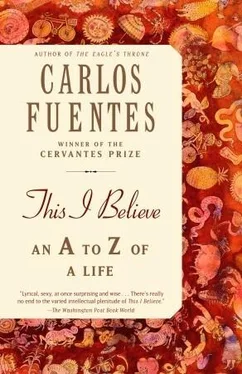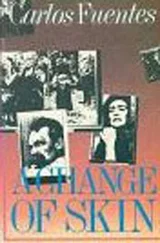“That is precisely what I am arguing with you. Let’s take it step by step. Let’s suppose that before God there was darkness. Let’s agree — after all, the Bible says so — that when God appeared, light emerged. But what came before God? What is that darkness that preceded the divine words ‘Let there be light.’ Can we even conceive of it?”
“I would tell you that if we admit to the existence of God, we should also admit that God subjugated Nothingness.”
“But if He were Everything, could there have even been a Nothingness? Do God and Nothingness coexist like absurd twins or, rather, are we simply confusing Nothingness with the absence of the world and mankind?”
“You are moving dangerously close to an argument that will leave us bereft of all arguments: that God is a creature of Man, not vice versa. But if God only exists because Man has imagined, thought of, or desired Him, then God does not exist in and of Himself.”
“Although he may very well have the greatest existence possible, that of being the product of human desire and imagination.”
“That is not what we are disputing right now. We are trying to envision a solitary God who, for some reason that escapes us, decided to create a being in His image and likeness: Man.”
“What for? If God is God, He needs neither the world nor man. He exists in and of Himself. He is enough for Himself. Why would he create something that is unnecessary? That is the core of the matter.”
“Perhaps God created the world because He felt lonely and one fine day experienced the horror of the void.”
“And so then are we creatures of a baroque God that reacts, as did Góngora and Bernini, to the horror vacuii ?”
“Let me suggest another image instead: a God that spends all of Eternity thinking about what would have happened had He not created the world.”
“I can also imagine a God that spends Eternity not worrying the least little bit about doing us the favor of creating us and introducing, incidentally, an intruder in His Creation.”
“The fact is there was a divine fiat, and Man and the World were created. We can argue as to whether God created us, but we cannot argue that we are here, that we live, that we exist and that we die. The issue really should be whether our existence bears a relationship with God or not. Are we or are we not His creatures and if we are, what is our position in His creative plan?”
“Well, for starters, the Bible presents us with a God that is a mere organizer of things. The sea and its little fishes are here, the land is there, although without cocoa or coffee or tomatoes or corn or potatoes. The animals are all in their place and set up in pairs, just as the tale of Noah describes. But in the Creation there are no buffaloes or iguanas or quetzals. Very well. God as the overseer of a vast, pre-American zoo. Manager of the largest pre-Columbian aquarium. Author of Eolus, the god and master of storms and the movement of the heavens.”
“But not of Ehecatl, the Aztec god of the wind, the American Eolus. .”
“Hold on — we will get to that in a moment. Let me continue; you keep interrupting me.”
“Am I like the Devil?”
“No, my friend. Not even the Devil’s advocate. As I was saying. .”
“As you were saying. .”
“The essential fact of human creation is that God created us in His image and likeness. The point of contention is clear and immediate. If He made us in His image and likeness and if, moreover, He knew everything beforehand, why then did He create us in the image and likeness of Evil? Why did He include the Devil in our image and likeness? Did the image of God, from the very beginning, encompass the image of the Devil?”
“Listen, I think Adam sniffed this part out from the very first moment. Milton offers a profound bit of intuition in Paradise Lost. Adam lashes out at Creation and rebukes God, asking Him, ‘Why couldn’t you have let me remain as clay? Why did you turn me into a man?’ ”
“Just imagine, as a response, that God had His temptations as well in the Garden of Eden. The temptation of living side by side for all eternity with His creations, Adam and Eve, like a father who spoils and is spoiled by his children. And then imagine that Adam and Eve, wiser than God, commit sin and expel themselves from Paradise, only to expel God at the same time. At God’s side for centuries of centuries, would Adam and Eve have been humans? They would never have had sexual relations or descendants. And they would have frustrated God’s design. He who is Immortal cannot live surrounded by Immortals. He is Unique. God fooled Himself inventing Paradise and Adam and Eve did Him a favor by divesting Him of this illusion.”
“ ‘Did I request thee, Maker, from my Clay / to mould me Man, did I sollicite thee / From darkness to promote me?’ Did Adam perceive the burden of existence as something so terrible that he would have preferred, as Milton says, to remain as clay in the darkness?”
“The advancement toward the light: one of the loveliest definitions of Creation, of all creation. But light only exists in contrast to darkness. Perhaps God regretted the Creation because He could not bear Adam’s immortality?”
“Are you trying to say that God is co-responsible for the horrors of humankind?”
“I am trying to say that perfect Good only lasts for a second whereas Evil will forever occupy the space of the subverted Eden.”
“Allow me to make a distinction. Evil knows itself to be Evil but it also knows Goodness, and this is precisely its advantage. Perfect, absolute, total Goodness does not know Evil and precisely because of this can fall victim to Evil.”
“God, after the Fall, turns himself into the referee in these issues.”
“No. In the end, He gives the Church that power. But we will discuss that topic later, with Jesus, in person. For the moment, I only wish to suggest that if the world is born out of God’s essence, Evil is inconceivable. And if Evil is born from Goodness, then we live in a world of the absurd. From there, this is what follows: First, burden the creatures of God, Adam and Eve, with an Evil that God could never have envisioned as part of a creative plan. Second, remind us that the Devil also belongs to Eternity. And third, console us by demonstrating that human liberty is a gift from God, practiced by Adam and Eve, that serves as an example of the infinite Divine goodness.”
“Are you saying that God is able to endure Evil if Evil is an act of liberty?”
“No, I am only suggesting that perhaps God negotiated with the Devil hoping that the eventual triumph of liberty in favor of goodness would give Him back the chips He lent the Devil to explain the existence of Evil.”
“But that would make God, whether He liked it or not, the Devil’s associate. Because, I repeat, Evil is capable of knowing both Evil and Goodness. Goodness, however, cannot conceive of anything beyond itself, including that which denies it. That is both the strength as well as the weakness of Goodness.”
“And I say to you that of course God knows both Good and Evil; but He knows them as a unit. In Man, Good and Evil are separated. And we have neither the might nor the right to unite them because that would make us God and God would no longer stand for that.”
“ ‘No longer.’ Do you add that condition to insinuate that, after the Fall from grace, God robs Man of the power to see Good and Evil as one discrete unit? That God wants to reserve that exclusive right for Himself?”
“No. At this level it is not God who intervenes, but History.”
“Which begins in the garden with Adam and Eve.”
“No. I believe that history begins with Cain. Abel is the promise of Paradise recovered, if you will, to continue with the Miltonian allusions. Cain, not Abel, is the second father and his patriarchy is based on crime. If God, malgré Nietzsche, has not died, it is because Cain’s crime makes it unbearable for us to experience history as crime, as fratricide, as injustice. We turn our eyes to God so that He may redress the fratricidal crime of Cain, civil war — not the nonexistent crime of Adam and Eve, givers of life and pleasure.”
Читать дальше












